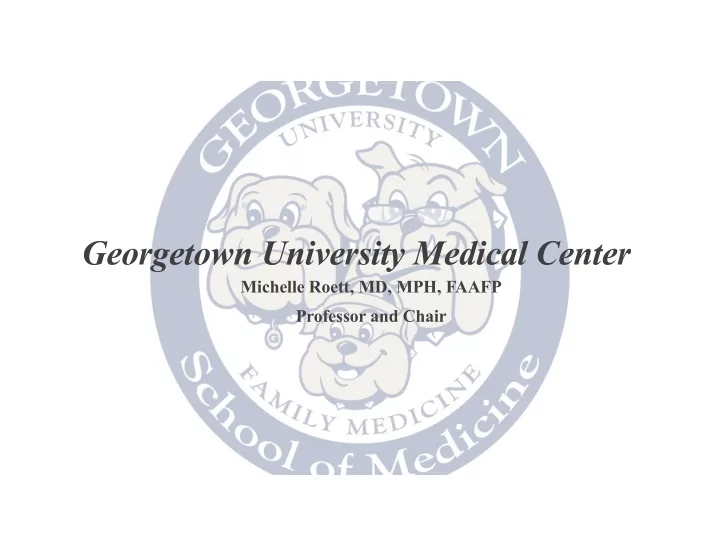

Georgetown University Medical Center Michelle Roett, MD, MPH, FAAFP Professor and Chair
Medical Student Interest in Family Medicine DEPARTMENT OF FAMILY MEDICINE GEORGETOWN UNIVERSITY MEDICAL CENTER MEDSTAR GEORGETOWN UNIVERSITY HOSPITAL
Georgetown University Department of Family Medicine MISSION 1. Teach Family Medicine as a model of excellence in primary care and community health to medical students, residents, fellows, and other health care professionals 2. Foster national leaders and educators in Family Medicine 3. Provide personalized evidence-based patient-centered care in a medical home model, with special emphasis on care to the underserved 4. Conduct community oriented, patient-based, and interdisciplinary research 5. Create and sustain campus/community partnerships that recognize our mutual assets and improve the health of our community
FMA Health: Sustaining Student Interest in Family Medicine 1 1. Fostering community-oriented mission; 6. Exposing students to new models, sustainable examples of patient-centered 2. Incorporating ethics and social care determinants of health in the curriculum; 7. Establishing diverse outpatient training 3. Introducing community learning and settings, including rural offices and CHCs service into medical education, as well as training in advocacy; 8. Creating opportunities to train students in a team-based, interdisciplinary setting; 4. Connecting students with dedicated, full- scope family physicians and peer mentors; 9. Developing rural tracks, tailored electives, or advanced clerkships with full scope of 5. Mitigating any environment that permits Family Medicine, including procedures, in specialty disrespect about students’ career different settings. choices; 1 Hughes LS, Tuggy M, Pugno PA, et al. Transforming Training to Build the Family Physician Workforce Our Country Needs. Fam Med 2015; 47(8) 620-7.
Georgetown University Department of Family Medicine 1. Fostering community-oriented mission ◦ Lead Community-Based Learning required first year course 2. Incorporating ethics and social determinants of health in the curriculum; ◦ Lead Patients, Populations and Policy M1 required course and Health Disparities and Health Equity M1 required intersession ◦ Lead Population Health Scholar Track 3. Introducing community learning and service into medical education, as well as training in advocacy; ◦ CBL, P3, faculty mentors for longitudinal Scholar Tracks in Health Justice, Population Health 4. Connecting students with dedicated, full-scope family physicians and peer mentors; ◦ Required Ambulatory Care M1 course, new AHEC Primary Care Mentorship Program 5. Mitigating any environment that permits specialty disrespect about students’ career choices; ◦ Admissions Committee, Preclinical Advising, Clinical Advising, Committee on Medical Education, Medical Student Life Advisory Committee, Mind-Body Medicine, medical center Strategic Planning Committees
Georgetown University Department of Family Medicine 6. Exposing students to new models, sustainable examples of patient-centered care ◦ Expand preceptor pool, faculty development opportunities for community preceptors (AHEC) 7. Establishing diverse outpatient training settings, including rural offices and CHCs ◦ Expand and formalize FQHC partnerships, IHS opportunities for students (AHEC) 8. Creating opportunities to train students in a team-based, interdisciplinary setting; ◦ Expand clinical pairings of students with resident experiences (e.g. inpatient, obstetrics, nursing home, home visit, procedures) 9. Developing rural tracks, tailored electives, or advanced clerkships with full scope of Family Medicine, including procedures, in different settings. ◦ Expand tailored electives in COPC, Social Determinants of Health
Mentorship, Pipeline Programs High School Students College Students ◦ Introduction to Community-Based Learning ◦ Summer Community-Based Learning ◦ Summer clinical and operational shadowing ◦ Summer clinical and operational shadowing ◦ Summer Health Disparities projects ◦ Summer Research ◦ Health careers summits ◦ Leadership summits ◦ Leadership summits ◦ Mind-Body Medicine
Funding Mechanisms FEDERAL FUNDING PHILANTHROPY/PRIVATE FOUNDATIONS ◦ Alumni or general donations toward ◦ HRSA Primary Care Training department Enhancement ◦ Capital Campaigns around social ◦ HRSA Area Health Education mission Center ◦ LOIs to private educational foundations with overlapping interests (e.g. social ◦ HRSA PCTE Primary Care determinants of health, health equity, Champions under-represented minorities in ◦ HRSA Academic Unit medicine) ◦ Speaker’s Bureau honoraria
Predictors of Family Medicine choice or Primary Care ◦ Strong Predictors: ◦Required first-year clinical experience with family physician 1 ◦Rural medical education 2 ◦Dual MD/MPH 2 ◦Early and longitudinal community-based learning 3 ◦ Less helpful predictors: ◦FMIG officership 2 1 Mengel M, Davis A. Required first-year generalist clinical experience courses and their relationship to career choice: the critical effect of family medicine involvement. Family Medicine 1995;27(10):652-657. 2 Wei McIntosh E, Morley C. Family Medicine or Primary Care Residency Selection: Effects of Family Medicine Interest Groups, MD/MPH Dual Degrees, and Rural Medical Education. Family Medicine 2016;48(5):385-388. 3 Essa-Hadad J, Murdoch-Eaton D, Rudolf MCJ. What impact does community service learning have on medical students' appreciation of population health? Public Health 2015; 129(11):1444-1451
Predictors of Choosing Primary Care 1. Pipeline programs ◦ Rural and underserved medical school settings have targeted high school, college and pre-medical students, successfully increasing the medical school acceptance rates for pipeline participants 1 2. Participatory community-based learning for medical students: ◦ Increases public health skills and knowledge ◦ Enhances understanding of communities ◦ Increases appreciation of social determinants of health and the local community ◦ Increases choice of primary care specialty 1 Gross DA, Mattox LC, Winkleman N. Priming the Physician Pipeline: A Regional AHEC's Use of in-state Medical School Data to Guide Its Health Careers Programming. J Health Care Poor Underserved 2016;27:8-18.
https://Familymedicine.Georgetown.edu https://familymedicine.georgetown.edu/annualreport Michelle.roett@Georgetown.edu
Recommend
More recommend